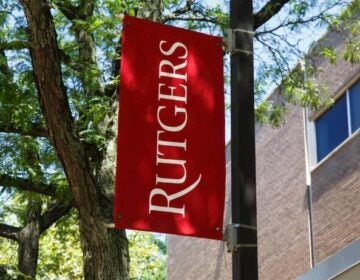Unions score victories in mayoral elections but this won’t stop education reform in N.J.
Among various New Jersey elections yesterday, Newark and Trenton’s mayoral contests pivoted on concerns about the growing influence of education reform on the state’s traditional public education system.
In both cases, the “education reform” candidate lost. In Trenton, Jim Golden came in third; Eric Jackson and Paul Perez will have a run-off election on June 10. In Newark, Shavar Jeffries lost by nine points to Ras Baraka, foe of reform-minded Superintendent Cami Anderson and defender of Newark’s educational status quo.
It’s easy to conclude, then, that initiatives like rapid charter school expansion, tenure reform, and data-driven teacher evaluations are bygone fads, no more relevant to city politics than hula hoops.
Traditional public education stands strong, asserted Analilia Mejia, head of the union-funded super PAC New Jersey Working Families Alliance today on PolitickerNJ, bolstered by a growing populist movement against hedge fund managers, Wall Street executives, and “corporate America.”
A grim day indeed for those of the education reform ilk, unfairly and, in almost every case, inaccurately linked to profiteering shysters. Are these election outcomes, then, harbingers of demise? What happens next?
There may be some municipalities where elections are simple things, wholly determined by respective candidates’ stances on various issues of interest to voters. Then there’s Trenton and, especially, Newark. It’s not possible to think about Ras Baraka’s victory without the context of the Fall of the House of Christie, whose transitory beguilement of most of New Jersey was instrumental in ushering in Facebook founder Mark Zuckerberg’s grant of $100 million and a plateful of education reform initiatives.
This week’s New Yorker features a story by Dale Russakoff that describes the 2010 Booker/Christie/Zuckerberg alliance as “the nation’s most audacious exercises in education reform. The goal was not just to fix the Newark schools but to create a national model for how to turn around an entire school district.” Now Booker’s gone to Washington and Christie is lost in the never-ending labyrinth of Bridgegate. Today’s headline of the British paper the Daily Mail blared, “Has Mark Zuckerberg’s $100 million Gift to Newark Public Schools Gone Down the Drain?”
Not really. First, mayors in Trenton and Newark don’t have much power. Second, school reform objectives are firmly established in both cities. Third, the respective winners, Baraka and Jackson/Perez, aren’t as ardently anti-reform as campaign literature indicates.
Trenton is one of N.J.’s 21 “Type 1” districts where mayors select the school board. So either Jackson (30% of the vote) or Perez (21% of the vote) will determine the make-up of the board. But the board itself has limited power; it’s under the control of a fiscal monitor and currently wrestling with a $10.5 million deficit.
Next September, one in four Trenton students will choose to enroll in charter schools and, in fact, frontrunner Jackson is a fan, especially of the New York City-based charter consortium called the Harlem Children’s Zone, which he called an “acclaimed” and “nationally recognized model.” His campaign platform calls for creating a Mayor’s Office of Education that will support “the school district leadership, charter and parochial school leadership, parents, municipal agencies, and non-profits.”
In Newark, where education reform played a far more prominent role in yesterday’s election, winner Baraka is no ally of Superintendent Cami Anderson and her “One Newark Plan,” which allows parents to select student placements, both charter and traditional.
Today’s NJ Spotlight notes that “[h]e focused his campaign rhetoric on fighting the state’s two-decade-old control of the school district, and became the harshest critic of state-appointed superintendent Cami Anderson and her policies, often calling on her to resign.”
But, of course, Newark (a Type 2 district where school board members are elected) is still under state control and Anderson’s continued tenure rides on Education Commissioner David Hespe’s say-so, not Baraka’s. Charter schools there continue to expand. Like Trenton, one in four students are enrolled in the city’s charter schools with many more on waiting lists.
And, campaign rhetoric to the contrary, Baraka’s not as anti-reform as you’d think.Steve Fulop, Jersey city mayor, gubernatorial hopeful, and Baraka-backer, told Spotlight that the new mayor is “not the enemy of all school reforms – including charters – that he was portrayed to be in the campaign,” and added that “[Baraka] understands that the charter community is in Newark and part of the education system in Newark.”
The New Yorker feature describes Baraka’s “aggressive turnaround strategy” while principal of Trenton’s Central High School and his appropriation of reform strategies. “I stole ideas from everyone,” Baraka says. Writes Russakoff, “In private, Baraka supported many of the reformers’ critiques of the status quo, including revoking tenure for teachers with the lowest evalutions. Although he publicly embraced the unions’ positions, he told me he opposed paying teachers based on seniority and degrees, as Newark did under its union contract. “We should make a base pay, and the only way to go up is based on student performance,” he said. He told me that many in Newark quietly agreed.”
So, are today’s election results a disappointment for education reform advocates? Of course. But there’s no demise. Instead, this is an opportunity to reflect on ways to address erroneous perceptions, garner public (rather than private) support, and continue to work towards together towards the universal goal that all New Jersey children and families have access to great public schools.
________________________________________
Laura Waters is president of the Lawrence Township School Board in Mercer County. She also writes about New Jersey’s public education on her blog NJ Left Behind. Follow her on Twitter @NJLeftbehind.
WHYY is your source for fact-based, in-depth journalism and information. As a nonprofit organization, we rely on financial support from readers like you. Please give today.





